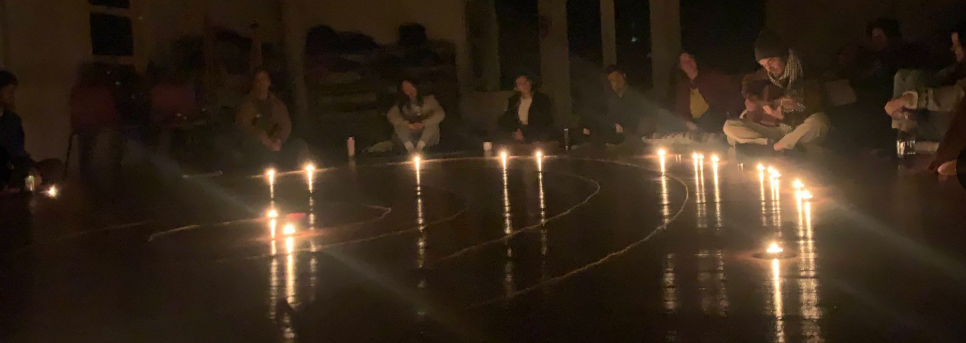
In this issue
Notice: The Network News is taking a break for a few months. You can stay in touch with what’s going on in the village by visiting the Narara Ecovillage website – in particular, these pages: EVENTS CALENDAR, and the NEV NEWS Blog
Features
Edible Weeds Connect People to Five Continents
– Emet Değirmenci

Emet teaching about dandelions
Over the past decade, I’ve explored why rewilding is vital in this Sixth Extinction period.
Biodiversity loss is one of our most pressing ecological crises. In response, I’ve focused on permaculture, agroecology, and ecological restoration—with a special emphasis on wild edible plants.
These resilient “weeds” are not just pioneer species that prevent erosion, clean waterways, and restore soils—they’re also cultural connectors. In my workshops across Türkiye, Australia, New Zealand, and the Pacific Northwest, I teach about 10 common edible weeds found on all continents. These plants hold stories: how different cultures harvest, cook, and value them.
While some scientists label certain weeds as invasive, this view is not universal. Take Opuntia robusta (wheel cactus): it’s invasive in Australia but a prized food and cash crop in Mexico. Clearly, context matters.
By definition, weeds are simply plants growing in the “wrong” place. But this perspective reflects a monocultural mindset. Instead of seeing them as pests, we can observe what they tell us about the soil—its fertility, pH, compaction, and more. Weeds are often the first to appear after ecological trauma—like mining, wildfires, or volcanic eruptions—playing a key role in restoration.
Consider dandelions. In the wild, they support biodiversity and attract pollinators. Yet in lawns and crop fields, they’re sprayed with chemicals despite their nutritional and medicinal value. Dandelions offer edible leaves, roots, and flowers. They can enrich our diets and even serve as companion plants in gardens, nourishing nearby crops.
From a young age, I’ve had a close relationship with weeds. I remember gathering edible greens with friends in spring to make börek, sharing freshly baked pastries with neighbours—a tradition rooted in gratitude and abundance.
Thus, there are many reasons to learn about and value our weeds from five continents. Over the years I’ve learned how, according to climate and seasonal changes, edible weeds such as Dandelion, Purslane (Portulaca oleracea), Plantain (Plantago spp.) and Lamb’s Quarters (Chenopodium album) could be our food, medicine and spiritual allies for us. I believe that edible weeds connect us to five continents.
Instead of fighting weeds, what if we befriended them? They are healers, teachers, and connectors—bridging cultures, ecosystems, and generations.

Gratitude is the doorway and grief, the other side of love: a Deep Ecology Experience

“Information alone does not change us. We don’t suffer from a lack of facts; we suffer from a lack of connection”
– Dave Burrows and Mark Rowland
A Deep Ecology Experience weekend in August was “one of the most profound experiences I’ve had in years”, according to one of the participants, Mark Rowland
Mr Rowland, who was the driving force behind Sydney Climate Action Week, has longstanding roles with Greenhouse in Sydney (a climate action ecosystem connecting governments, scientists, companies, climate tech companies, ecopreneurs, and society) and Green Our Planet in the US.
He wrote in LinkedIn on 11 August 2025:
Last weekend, I had one of the most profound experiences I’ve had in years. A Deep Ecology workshop led by the legendary John Seed.
John was recently interviewed on Nate Hagens’ Great Simplification podcast, my absolute favourite podcast. John is a living legend; he has been a rainforest defender since 1979, co-author of Thinking Like a Mountain with Joanna Macy, and one of the pioneers of the Deep Ecology movement.
During the workshop, we journeyed through the “Work That Reconnects” spiral: Gratitude → Honouring our Pain for the World → Seeing with New Eyes → Going Forth.
This was not your traditional workshop – this was a lived experience.
🙏 We began in gratitude, discovering the grounding power of naming what we cherish in the midst of crisis. John calls gratitude the doorway that makes it possible to face the truth without collapsing under it.
💔 From there, we honoured our grief; not as a weakness, but as “the other side of our love.” In a world where we are taught to suppress our anguish over ecological destruction, this was a rare space where grief could be spoken, witnessed, and transformed into energy for action.
🦚 We stepped into seeing with new eyes, through rituals like the Council of All Beings, where we gave voice to the more-than-human world; the species, places, and elements that have no seat at human decision-making tables. As John says, these voices are not abstract; they live in us, waiting to be heard.
💪 We ended with Going Forth – naming concrete steps, big or small, to bring our ecological identity into our everyday lives.
Why does this matter?
Because information alone does not change us. We don’t suffer from a lack of facts; we suffer from a lack of connection. Connection to each other, to place, to the living systems that sustain us. The Deep Ecology Workshop is a kind of cultural homecoming, a return to something our ancestors practised for thousands of years, which we have almost forgotten in modern culture.
The next workshop is in October. There are only 35 seats available; not by accident, but because 35 is John’s magic number for creating a container where trust can deepen, where every voice matters, and where transformation is possible.
If you are feeling grief, overwhelm, or numbness about the state of the world…
If you’re an activist running on empty, a leader seeking clarity, or simply someone who loves the Earth and wants to serve life … Let yourself be resourced, reconnected, and reminded that you are not separate from the world you are trying to save.
Book your place now and join a truly special weekend that will change your life.
🌿 Deep Ecology Workshop — October 17-19
🌿 Narara Ecovillage
🌿 Only 35 places available.
🌿 Registration: https://events.humanitix.com/17-19-october-2025-deep-ecology-narara-ecovillage-with-john-seed-and-friends
Our precious Dark Skies
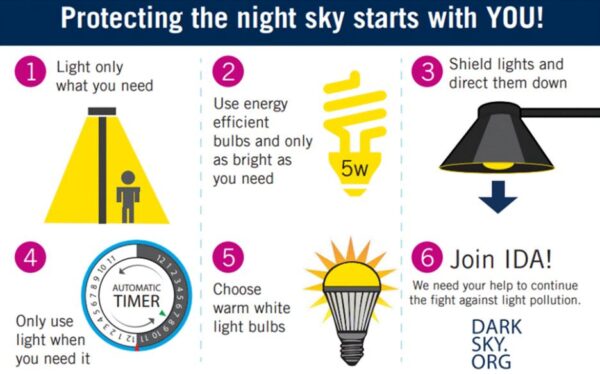
– Olga K
A growing body of evidence has linked light pollution directly to ecological disruption and harm to human health, not to mention unnecessary energy consumption. What can you do about it?
‘Light pollution’ is the inappropriate or excessive use of outdoor artificial light. According to the International Dark-Sky Association, most outdoor nighttime lighting is inefficient, too bright, poorly targeted, improperly shielded, and, in many cases, completely unnecessary. For example, most streetlights scatter the light rather than pointing it in the direction it’s needed, and many lights stay on even when no one is around.
Disrupting ecosystems and wildlife
The daily cycle of light and dark is one of the strongest environmental factors for life on Earth.
Scientific evidence suggests that artificial light at night harms a wide range of wildlife that use regular intervals of light and darkness to guide vital behaviours such as foraging, metamorphosis, hunting, mating, and reproduction. The negative effect of constant artificial nighttime lighting on the orientation of animals has been well studied and is supported by a large body of evidence. For example, artificial light can disorient migrating birds, entrapping them and making them lose their way.
Other animals negatively affected by light at night include moths, lacewings, beetles, bugs, caddisflies, crane flies, midges, hoverflies, wasps, bush crickets, and some spiders. They use moonlight for navigation, so may be attracted and trapped by artificial light. Some predators use this attraction to their advantage, which can affect food webs in unanticipated ways.
In addition, skyglow, which is light pollution diffused by clouds and air particles, has been shown to impact the behaviour of organisms far away from direct light sources. Research confirms that light from cities can disrupt the foraging patterns of nocturnal pollinators like fruit- and insect-eating bats in nearby forests.
Glare from artificial lights can also have a negative effect on wetland habitats, home to amphibians such as frogs and toads, whose breeding behaviour is significantly altered by artificial lights, resulting in population decline.
Further, some researchers believe that brighter nights may be a factor in recently documented insect decline. Insect numbers have decreased by 80% in some places, and it is estimated that 40% of insect species are on the verge of extinction. This decline has a negative impact on all species that rely on insects for food or pollination.
Thus, the cumulative effect of small behavioural responses induced by artificial lighting at night shifts the delicate balance of the environment, causing significant changes in species distributions and potentially disrupting key ecosystem functions.
Risks to human health
Our physiology is deeply entwined with the cycles of darkness and light.
Light pollution negatively affects the body’s natural rhythms, and can increase the risk for a range of conditions, including obesity, diabetes, heart disease, depression, stroke and sleep disorders. Furthermore, recent research shows that light at night triggers signals that cause a decrease in the normal production of melatonin, a suppressant of cell division in cancerous tissues.
Wasteful energy consumption
Poor lighting design wastes electricity, exacerbating energy dependence, and releases a significant amount of greenhouse gas into the atmosphere, contributing to climate change.
What to do
Lighting standards suggested by environmental groups, International Dark-Sky Association (IDSA) and Australasian Dark Sky Alliance (ADSA) aim to reduce the amount of light pollution and are based on a few simple and effective principles
- Use light only where and when it is needed. For example, running outdoor lights at full power during the night may not be necessary, given the reduced level of pedestrian and vehicle activity between midnight and 5:00am
- Reduce the height of the lights so that they create an ambient glow and only illuminate the area needed
- Shield and point the light downwards so it doesn’t create glare and is not brighter than necessary. Fully shielded fixtures can provide the same level of illumination as unshielded ones, but with lower cost and less energy waste
- Use warm-coloured lights to minimise blue light emissions (which have been shown to suppress melatonin, contributing to sleeplessness). The International Dark-sky association recommends using light with a colour temperature of no more than 3000 Kelvin.
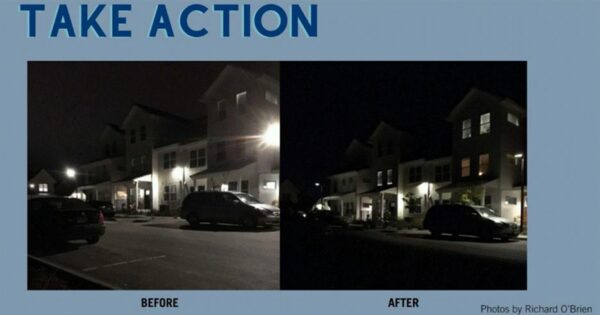
This article has been republished – from the Network News 2022
Permaculture Principles – The Importance of Edges
– Lorraine Hawdon
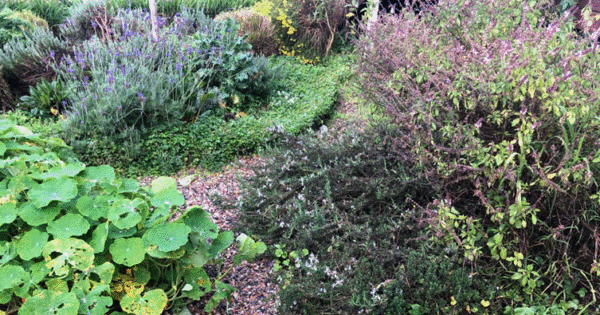
Herbs such as Rosemary, Oregano,Thyme and Nasturtiums love the warmer microclimate created by the edge of a gravel path. Photo taken after hail!
Garden Edges, every garden has them, but do you love your edges? The Permaculture Principle of ‘Using the Edges and valuing the Margins’ is an effective method anyone can use to create more diverse habitat and production in their garden. In fact, it’s also a great way to begin retrofitting your existing garden to include more Permaculture elements. Edges provide a variety of microclimates to enable you to increase the diversity and range of plants you grow. The interface between two different surfaces and edges creates a third productive growing place. As an extra bonus, it can also look attractive! Curved edges such as those in a Mandala Garden create more productive space than straight edges..
Edges are not just about Garden beds. Consider the edge of your living areas and gardens, your neighbours property and your boundary. All have the potential to create highly productive growing spaces. Beyond your own backyard connections can be made between your personal life and your community. How can the edge of connections be used to create a more sustainable and productive society? The margins of mainstream society are where the magic can happen!
Think about joining a Community Garden or project, living in an intentional community such as Narara Ecovillage, joining an environmental group or helping defend our natural world by becoming an Activist.
Begin,experiment and develop and most of all, enjoy exploring “Living on the Edge!”
You can read about and explore more examples of ‘Using Edges’ here: https://permacultureprinciples.com/permaculture-principles/_11
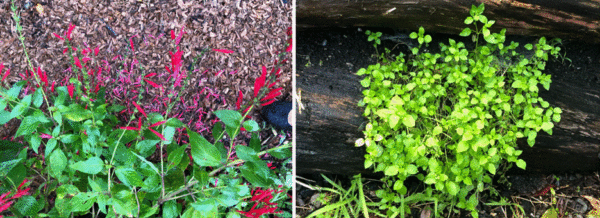
Left: Microclimate on an edge for plants with edible flowers to grow in more shady spots.
Right: Volunteers grow between the spaces on the edge. This is edible Chickweed (Stellaria media).
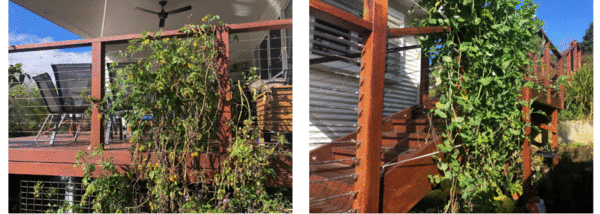
Left – The margin between living and garden areas: A tomato fruiting in winter on a north-facing deck-edge.
Right – Using the edge between hard and soft areas: Peas on a stairway railing.
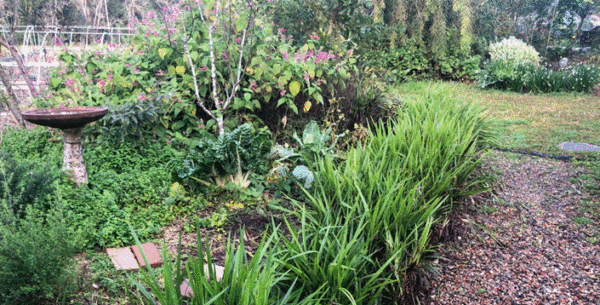
An edge of Native Dianellas provides habitat and edible berries.

Easy to grow native violets on the edge of vegetable beds. They have edible flowers.
August flowers on the Central Coast
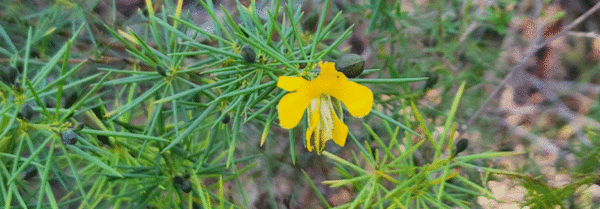
If you live on the Central Coast, you may be interested in this pictorial information from the Central Coast branch of the Australian Plants Society.
Scroll down on this page to find NSW Central Coast native wildflowers that may be seen in local bushlands during August.
Against the tide, we need to slow down and rest
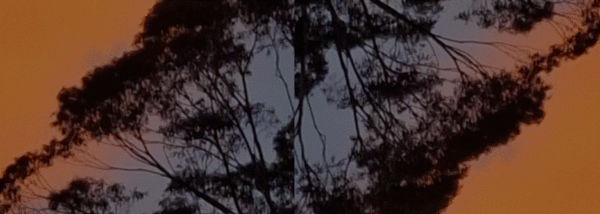
–Suzie Brown
Most of the things we need to be most fully alive never come in busyness. They grow in rest.― Mark Buchanan
Does it feel to you like the world seems to be moving faster all the time? Many people report feeling overwhelmed by the busyness of their lives, the amount of information and stimulation of technology, and the seemingly endless stream of conflict and disasters in the news media.
Coupled with the rising cost of housing and food increasing stress for many, and it’s easy to see why one in three Australians reported feeling drained and burnt out in 2025 .
Too many people are feeling wound up all the time and unable to rest and let go.
And yet, we must! To care for ourselves and the planet it’s crucial that we slow down and literally smell the flowers. Nature is calling to us to slow down the consumption of energy, water, soil, forests and the resulting waste. And our bodies (many with chronic illnesses) are calling us to give them a rest and allow them to recover.
In Narara Ecovillage, like many intentional communities, most residents are choosing to live a different way. Not only to live in community with others, but to also slow down, work less and spend more time on more meaningful and nourishing things like time in the forest, gardening, outdoors adventures, craft, music, art or volunteering.
One of the most effective ways to unwind our nervous system is meditation. The ecovillage offers multiple meditation sessions each week where residents and visitors join in our community hall for silent meditation together.
I am an ecovillage resident and a long-time teacher of Insight Meditation and Mindfulness, in the tradition of Western Buddhist meditation.
Mindfulness meditation focuses on present moment awareness of our breath, body, thoughts and emotions, with an emphasis on kindness and compassion towards our experience.
Meditation is needed more and more in this over-stimulated and stressed world. It’s a way to take back our own headspace, stop the deluge of over-stimulation and allow peace and quiet. Stopping and simply breathing and being is the best way to rest the mind and body. And while adequate sleep is crucial, we don’t always need to sleep to feel rested – meditation is a form of deep rest in itself.
I am offering an afternoon workshop on 24th August in the Village Hall, where deep rest will be the focus. Through guided meditations, deep relaxation, reflective sharing and meditative walking under the trees, it will be a chance to unwind and reset your nervous system.
Slowing down and resting: this is how we can be kind to ourselves, and the planet
Events
Wed 20 Aug: Offers and Needs Market

-From New Economy Network Australia (NENA)
Join NENA’s Localisation Hub for a fantastic 2-hour guided process where people meet to identify and exchange passions, knowledge, skills, resources, opportunities, and needs. From finding a place to live, to sharing a recipe, engaging a professional service or a tutor, the opportunities are endless!
All welcome, including children.
We see this as one of the ways to empower communities to take charge of their economic autonomy, creating new economies that are on a human scale, equitable and localised. Economic empowerment builds resilience in the face of crisis and change.
When: Wed, 20 Aug, 6:30pm – 8:30pm Where: Online: register to get the link Cost: Free More information & registration: HERE!
- Here’s a 6 minute video describing the process: https://vimeo.com/356823600
- Here’s a 4 minute YouTube: https://www.youtube.com/watch?v=ArAxQaXy
Sat 23 Aug: For the Love of Kirtan

Join Mark and Meni (our fabulous new drummer) for an evening of mantra chants, music and community in the Village Hall.
Kirtan is more than just music: It is a spiritual practice that opens the heart and brings participants into a state of peaceful unity and bliss. We hope it will offer a sense of connection to that sacred space inside all of us — where beauty resides and every step is a dance with the Divine.
Kids most welcome.
- When: 4.30 – 6pm, Sat August 23rd
- Where: Narara Ecovillage Hall, 30 Gugandi Rd 2205
- Cost: by donation
- More details: No registration- just turn up! Bring a cushion or sit on chairs provided and feel free to come and go if needed.
Sun 24 Aug deadline: Invitation to get involved in Before the Tide Festival

We are seeking expressions of interest from potential speakers, volunteers, partners or sponsors for this community-led festival exploring the themes of:
- Intentional communities e.g. ecovillages, co-housing
- Climate change solutions, actions (technological and personal) and activism
- Alternative Economies e.g. credit unions, co-ops, steady state & circular economies
Join a vibrant movement building toward positive change and sustainable futures—Before the Tide rises.
- When: Expressions of interest: Sun 24 Aug; Festival: Fri 21– Sun 23 November 2025
- Where: Festival: Narara Ecovillage Hall, 30 Gugandi Rd, 2250
- Cost: The festival will be free to attend
- Register your interest: Please use the Festival Sign-Up Form before Aug 24. Contact co-ordinators Richard Weller ofClimate Future andJohn Shiel of Narara Ecovillage richard.w.gos@gmail.com | jafshiel@gmail.com
Note that accommodation is available in or near the village.
Sun 24 Aug: Meditation workshop led by Insight teacher Suzie Brown
Reclaim rest and slow down from the busyness of daily life. Deep rest is crucial for healing and resetting our nervous systems, helping us to find more ease, balance and compassion in our life.

This 3-hour workshop will include guided meditations, contemplative reflections, walking meditation and gentle movement. All in the peaceful, green surrounds of Narara Ecovillage!
- When: Sunday 24th August 1pm for a 1.30pm start – 4.30pm
- Where: Narara Ecovillage, 30 Gugandi Rd 2250
- Cost: $15 venue hire and then by donation for the teaching on the day
- Registration and more info – https://www.trybooking.com/DEHNC
Sat 30 Aug: Open Day at Narara Ecovillage

The Open Day (talk and tour) shows what Narara Ecovillage is all about, and demonstrates how we are activating a resilient community with ecological, social and economic potential by:
All are welcome.
Shared food growing, natural retreats and permaculture spaces shared community and workplaces highly efficient, low-carbon homes
- When: Sat August 30, 10.00am – 1.00pm
- Where: Narara Ecovillage Hall, 30 Gugandi Road 2250
- Cost: $15 includes talk & walking tour around village, kids & NELN members free!
- More Details and Registration
Sat 30 Aug: Ten edible weeds which grow in five continents

- When: Sat August 30, 2025 @ 2:00 pm – 4:00 pm
- Where: Narara Ecovillage Village Hall, 30 Gugandi Rd 2250
- Cost:$20-$65 (scale: low-income to advocate)
- Tickets: https://august-open-day-2025.lilregie.com/booking/attendees/new (Scroll down to select this event)
Walk with a wild plants expert, taste and learn about many edible foods found in our backyards.
- Discover the edible weeds that grow in August
- Medicinal herbs
- Nutritional wild food
- There will be chickweed pesto to taste and the recipe supplied.
Emet will share her knowledge of wild plants gathered from five continents. Stroll around Narara Ecovillage, explore roadsides, wetlands, forest and gullies, gather and taste what the land has to offer. Emet Değirmenci has lived in Australia, Turkey and the US and is a long-term social ecologist; an independent researcher in women and ecology; a writer, keynote speaker, teacher, and forager; a re-indigenizing and rewilding enthusiast; and an ecological farm designer, with 17 years as a permaculture teacher.
Fri 5 & Sun 14 Sept: Free Zumba Gold Classes

Carin is offering Free Zumba Gold Classes as part of AUS ACTIVE’s Million Moves Challenge. The challenge involves doing 75 moves for 21 days in September. Join Carin to participate in the Challenge: https://millionmoves.org.au/t/zumba-gold-with-carin
- When and where:
- 11am Friday 5th September, Narara Ecovillage Hall
- 3pm Sunday 14th September with SPIRAL COAST/Roundabout Circus, Sensory Park Showground Rd, Gosford
- Cost: Free
- For info about regular Friday classes ($15 per session) HERE
- Queries: Carin: brightdiets@gmail.com
Two events from the Localising Food Project:
Fri 26 Sept: Edible Paradise: Local Food Resilience talk and film

- When: Fri 26 Sept, 7-9pm
- Where: Narara Ecovillage Hall, 30 Gugandi Rd 2250
- Cost: $10-$25
- More info and registration: https://localfoodresilience-2025.lilregie.com/booking/attendees/new
Join Robina McCurdy for a talk and film sharing how to empower households, communities and entire bioregions to take responsibility for their own food, seeds and associated economies. Visit amazing food-forest projects and join the quiet revolution connecting with councils to grow long-term, multigenerational solutions for our food.
Sun 28 Sept: Local Food Resilience on the Central Coast

Networking + Produce Showcase + Workshop with Robina McCurdy
Giving local communities on the Central Coast the tools and empowerment to be fully responsible for their own food and seeds, from household to bioregion. Activities include: Co-operation amongst food system players, creating local seasonal calendars, establishing a Central Coast regional food resource inventory, strategising food security action plans and generating local food economies.
- When Sun 28 Sept, 10:00 am – 4:00 pm
- Where: Narara Ecovillage Hall, 30 Gugandi Rd 2250
- Cost: $39-79
- Registration: https://localfoodresilience-2025.lilregie.com/booking/attendees/new
Fri 17- Sun 19 Oct: Deep Ecology Immersion at Narara Ecovillage
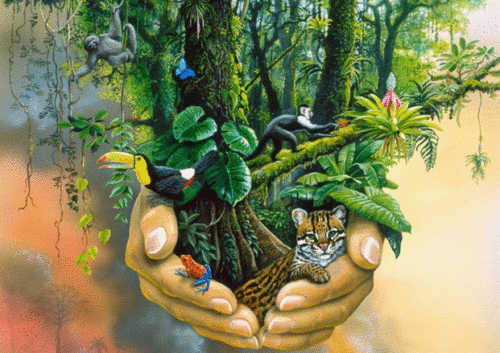
-Hosted by John Seed, Jane Lynch and friends
Deep Ecology is a philosophy which understands that the illusion of separation between humans and the rest of the natural world is the engine driving the 6th mass extinction currently underway.
This transformative workshop allows us to become aware of our rootedness in the living Earth and the renewal, empowerment and vision that invariably ensue.
- When: 4pm Friday 17- 4pm Sunday 19 October, 2025
- Where: Narara Ecovillage Hall, 30 Gugandi Rd 2250
- Cost: $150 TO $600 according to your means. 25% of proceeds go to rainforest conservation
- More info & Registration here
Other Deep Ecology workshops around Australia this year. Reviews from previous participants.

